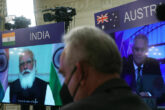May 16, 2018
On China’s New Silk Road, Democracy Pays A Toll
Great power competition is back. And China is now combining its vast economic resources with a muscular presence on the global stage. One of Beijing’s key efforts is the Belt and Road Initiative, a trillion-dollar endeavor to link together Asia, the Middle East, Africa, and Europe through a web of mostly Chinese-funded physical and digital infrastructure.
Much of Washington has fretted over China’s mercantilist approach to economics in general and views the Belt and Road Initiative largely through this lens. Yet the concerns over Beijing’s current approach should go beyond dollars and yuan. By fueling debt dependency, advancing a “China First” development model, and undermining good governance and human rights, the initiative offers a deeply illiberal approach to regions that contain about 65 percent of the world’s population and one-third of its economic output.
The hype surrounding the Belt and Road Initiative — Chinese President Xi Jinping’s signature initiative on the world stage — has recently shifted into overdrive. In China’s domestic politics, support for the project has come to signify loyalty to the country’s president-for-life. At the same time, the Belt and Road serves as an overarching narrative into which Beijing can fit its foreign economic policy in regions as disparate as the Arctic and Latin America. Yet the initiative’s rhetoric and branding should not obscure its core aim: to access markets and project influence and power throughout Eurasia and the Indian Ocean rim. And China has already dedicated significant resources to the effort: Estimates put total Belt and Road-related construction and investment at more than $340 billion from 2014 to 2017.
Read the Full Article at Foreign Policy
More from CNAS
-
Indo-Pacific Security / Energy, Economics & Security
Trump Unfriends Modi's India: Trump Frothing, India CalmFrom tariffs to tantrums-Trump's latest anti-India tirade stirs global concern. As Washington watches in disbelief, Shiv Aroor discusses what this "break-up" means for India-U...
By Daniel Silverberg
-
Indo-Pacific Security / Transatlantic Security / Middle East Security
A Project for a New World OrderIndeed, the gathering in Beijing suggests that the axis, rather than withering following the war in Iran in June, has momentum....
By Richard Fontaine & Andrea Kendall-Taylor
-
Indo-Pacific Security / Transatlantic Security / Middle East Security
Xi, Putin, Kim Project United Front in ChinaRichard Fontaine, chief executive officer at the Center for a New American Security, joins BBC to discuss the Axis of Upheaval and the level of concern from the Trump administ...
By Richard Fontaine
-
How the U.S. Should Push the Quad-Plus to Protect Undersea Cables
Subsea sabotage marks a new era in gray zone warfare, and the United States and its partners have a narrow window to expose and confront this threat before it becomes the new ...
By Ryan Claffey




